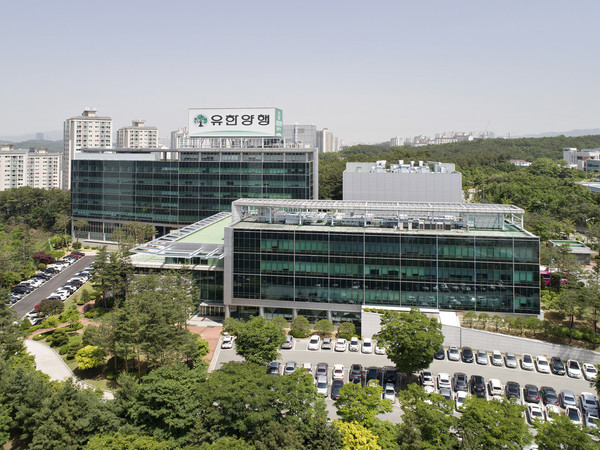Korea Biomedical Review is publishing a series of articles to analyze the top 10 Korean pharmaceutical and biopharma companies with the largest market capitalizations listed on the main bourse, Kospi, and the tech-heavy Kosdaq. The series aims to reflect key industrial issues and the flow of the capital market in the Korean pharmaceutical and biopharma industry. This is the fifth installment. -- Ed.
Yuhan Corp. is increasing investment in new drug R&D, despite deteriorating profitability.

Yuhan said Thursday that it recorded about 1.78 trillion won ($1.37 billion won) in sales in 2022, up 5.2 percent from 2021.
Despite the increase in sales, the company saw a 25.9 percent and 6.6 percent on-year drop in operating profit and net profit last year, recording 36 billion won and 90.6 billion won, respectively.
Yuhan said profits decreased due to an increase in R&D expenses and a decrease in milestones from its licensing deals.
In detail, most of Yuhan's sales of over-the-counter (OTC) and prescription drugs expanded last year.
Regarding OTC drugs, sales of the nutritional supplement Mag-B reached 15.8 billion won last year, showing the highest increase of 28.3 percent from the previous year. Antiphuramine, a massage lotion for immediate muscle pain relief, had the highest sales at 29.8 billion won among OTC drugs.
In prescription drugs, sales of cold medicine Cough Syrup showed the most remarkable growth in 2022, with sales reaching 30.2 billion won, an increase of 144.1 percent from the previous year.
Yuhan’s prescription drug with the largest sales was the diabetes treatment Trajenta, which recorded sales of 119.1 billion won, a slight 2.5 percent fall from 2021.
Despite falling profits, Yuhan said it would accelerate research and development (R&D) further to improve mid- to long-term profitability.
Notably, the company's highest anticipation this year is receiving approval for Leclaza, its non-small cell lung cancer treatment (NSCLC), and Korea's 31st locally-developed new drug, as a first-line therapy.
The company disclosed the results of phase 3 clinical trials of Leclaza in December and has been working toward switching the treatment to a first-line treatment within the first quarter of this year.
Leclaza has been serving as the company's new growth engine since its launch in July 2021, with the drug recording 30 billion won in sales in 2022.
However, there were limitations to its sales growth as the treatment was only approved as a second-line treatment, which is prescribed when a first-line treatment is ineffective.
Also, Yuhan plans to continue its prowess in other R&D areas.
The company has 29 new drug pipelines and 16 incrementally modified drug (IMD) pipelines other than Leclaza.
Analysts expect that such new drug development will contribute to Yuhan's earnings growth moving forward.
"Yuhan's sales growth should accelerate if the first-line treatment for Leclaza is approved in Korea," said Oh Eui-rim, an analyst at Korea Investment & Securities. "In addition to Leclaza, there is a possibility of additional license deals as the company is developing various candidates."
Seo Geun-hee, an analyst at Samsung Securities, agreed, after evaluating that Yuhan has the most visible new drug candidate among Korean biopharmaceuticals to advance into the global market.
Seo stressed that in addition to Leclaza, follow-up pipelines also deserve attention.
"The company has completed phase 1a clinical trial for YH35324, an allergy treatment candidate, and has been recruiting for clinical trial 1b, which is scheduled to end in the first half of 2024," Seo said. "In preclinical studies, YH35324 has been confirmed to have an excellent Immunoglobulin E (IgE) reducing effect compared to Novartis and Roche's Xolair."
Seo also highlighted YH32367, a HER2x4-1BB bispecific antibody candidate for breast cancer treatment, which is in phase 1a clinical trial.
"YH32367 has demonstrated superior anti-cancer effects compared to Herceptin in preclinical studies," Seo said.
Related articles
- [Top K-Pharma Analysis ④] SK Bioscience faces trouble as sales, operating profit fall drastically in 2022
- [Top K-Pharma Analysis ③] 'Celltrion to see a decrease in operating profit in 2022, but still an attractive stock option for investors’
- [Top K-Pharma Analysis ②] LG Chem's life science division aims to achieve ₩1 tril. sales in 2023
- [Top K-Pharma Analysis ①] Samsung Biologics is 1st Korean biopharma company marking ₩3 trillion sales
- [Top K-Pharma Analysis ⑥] Hanmi Pharmaceutical continues focus on R&D investment as it celebrates in 50th anniversary
- [Top K-Pharma Analysis ⑦] SD Biosensor's operating profit deteriorates as Covid-19 pandemic calms down
- [Top K-Pharma Analysis ⑧] GC’s 2022 earnings expected to be largest in company's history
- [Top K-Pharma Analysis ⑨] Chong Kun Dang’s earnings solid, despite betting big on new drug R&D
- [Top K-Pharma Analysis ⑩] Analysts paint rosy picture for Cosmax, citing recovery in Chinese demand
- [Top K-Pharma Analysis ⑪] HLB needs to start showing results
- [Top K-Pharma Analysis ⑫] Alteogen to start reaping benefits from its licensing agreements
- Lung cancer drug Leclaza proves benefit through real-world data
- [Top K-Pharma Analysis ⑬] Caregen bullish on 2023 sales, targets more than double growth
- [Top K-Pharma Analysis ⑭] Medytox's market cap doubles in 4 months
- Yuhan acquires J INTS BIO’s TKI to develop first-in-class NSCLC drug
- Yuhan's Leclaza indication expanded as 1st-line NSCLC treatment
- [Top K-Pharma Analysis ⑮] ST Pharm turns from white elephant to cash cow for Dong-A Socio Holdings
- [Top K-Pharma Analysis ⑯] Hugel accelerates global expansion following record-breaking sales

